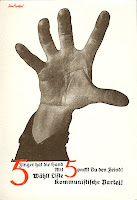John heartfield (1891-1968).
Born with The name Helmut Herzfelde in Berling 1891, is now known as John Heartfield for fear of political persecution in Germany. Obviously, John Heartfield was an enthusiastic and famous artist of the Dadaism revolution that dominated Most European country in the approach of the first World War I . Grown up as an orphan at the age of seven (7), served as an apprenticeship bookseller in Wiesbaden 1905-06, before going to Munich to study Art at the "Kunstgewerbeschule" from 1908 to 1911. After a brief interval as a graphic artist in Mannheim, Helmut Herzfelde returned to Berlin. There he studied once again, at the "Kunst- und Handwerkerschule", until 1914, when the first world war broke out. In 1915-16 he was inducted for active service into the German armed forces. In 1916 Helmut Herzfelde was so incensed at the anti-British feeling in Germany that he protested by changing his name to John Heartfield, using this pseudonym for the rest of his career. That same year, 1916, John Heartfield and his brother founded the Malik Verlag publishing house in Berlin; John Heartfield was responsible for the graphics for its publications.
In 1917 John Heartfield became a follower of the Dada movement in Berlin and that same year he joined the German Communist Party (KPD). He met George Grosz, who, like Heartfield, worked for the leftwing satirical publications "Die Pleite" and "Der Knüppel".
From 1924 to 1933 John Heartfield designed illustrations for the "Arbeiter Illustrierte Zeitung", the Communist Party mouthpiece.
John Heartfield developed an experimental approach to the graphic arts. He often worked with photomontage, using the medium to create pictures that made extraordinarily powerful statements. Under the influence of George Grosz, John Heartfield went on from there to develop the political photomontage. From 1920 John Heartfield designed his first stage sets for Erwin Piscator and Max Reinhardt. In 1929 Heartfield contributed photomontages to Kurt Tucholsky's "Deutschland, Deutschland über alles
These are three examples of arts featuring the elements of Dadaism.
 |
I. " Hand has Five Fingers," John Heartfield (born Helmut Herzfeld), 1928
II. "Dada Conquerors," Raoul Hausmann, 1920
III. "Trench Warfare," Otto Dix, 1932
All of these three pictures emphasize artists idea of describing social political condition of the society whose government is loosing control of the welfare of its population, culminating to political anger , disuniting , disorganized, and further more, steps into the war. "Dada Conquerors,'' Raoul Hausmann, 1920
attempted psychologically to send a cynicism message about the conventional society's values especially in Europe. An audience, can synthesize that a message could be : DADA there is revolt in our society; something that can be avoided. For Fact, by the same period, that these Dada arts manifested, a war collapse in Europe known as the World War I.
attempted psychologically to send a cynicism message about the conventional society's values especially in Europe. An audience, can synthesize that a message could be : DADA there is revolt in our society; something that can be avoided. For Fact, by the same period, that these Dada arts manifested, a war collapse in Europe known as the World War I.
How does one achieve eternal bliss? By saying Dada. How does one become famous? By saying Dada. With a noble gesture and delicate propriety. Till one goes crazy. Till one loses consciousness. How can one get rid of everything that smacks of journalism, worms, everything nice and right, blinkered, moralistic, Europeans, enervated? By saying Dada. Dada is the world soul, Dada is the pawnshop. Dada is the world's best lily-milk soap. Dada Mr Rubiner, Dada Mr Korrodi. Dada Mr Anastasius Lilienstein. In plain language: the hospitality of the Swiss is something to be profoundly appreciated. And in questions of aesthetics the key is quality. Dada Manifesto (1916, Hugo Ball)
Information sends to us from this quote converge with Nietzsky philosophy's that " God is dead". the truth about religion differ from science.Where is the place of God to solve the need and social issues of everyone. In Germany,disorder and trouble emerged on by what is the purpose of happiness in their society on issues like Distribution of income. and individual social status. pioneer of Dada = Anti-Nazi, Anti-Jesus. what a disjunctive life it was can you Imagine? Yesterday,Today Mama if mama is always rich and swishing to forever Dada leaving mama poor forever the majority of people refuted and there is war.


No comments:
Post a Comment